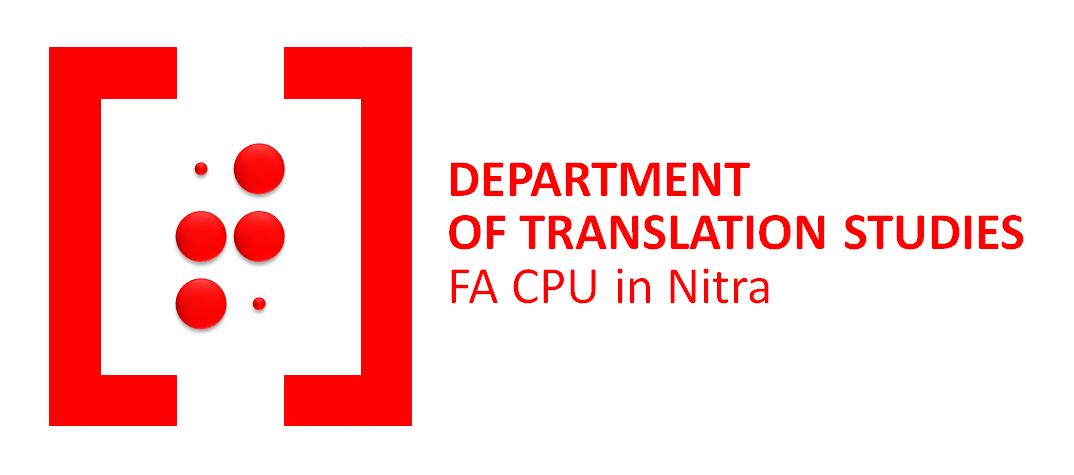The Department of Translation Studies currently provides education in the field of translation and interpreting in a combination of study programmes:
English Language and Culture – German Language and Culture
Duration: 2 years (4 terms)
Form: full-time
Study program supervisors: Prof. Edita Gromová, Doc. Ružena Žilová, PhD. and Prof. Daniela Müglová, PhD.
Study programme
Master’s degree (Mgr.)
English Language and Culture – Russian Language and Culture
Duration: 2 years (4 terms)
Form: full-time
Study program supervisors: Prof. Edita Gromová, PhD., Prof. Daniela Müglová, PhD. and Prof. Natália Muránska, PhD.
Study programme
Master’s degree (Mgr.)
English Language and Culture – Slovak Language and Culture
Duration: 2 years (4 terms)
Form: full-time
Study program supervisors: Prof. Edita Gromová, PhD., Prof. Daniela Müglová, PhD. and Doc. Martin Pukanec, PhD.
Study programme
Master’s degree (Mgr.)
English Language and Culture – Spanish Language and Culture
Duration: 2 years (4 terms)
Form: full-time
Study program supervisors: prof. PhDr. Daniela Müglová, CSc, prof. PhDr. Edita Gromová, CSc. and doc. Mgr. Edita Hornáčková Klapicová, PhD.
Study programme
Master’s degree (Mgr.)
German Language and Culture – Russian Language and Culture
Duration: 2 years (4 terms)
Form: full-time
Study program supervisors: Doc. Ružena Žilová, PhD., Prof. Daniela Müglová, PhD. and Prof. Natália Muránska, PhD.
Study programme
Master’s degree (Mgr.)
German Language and Culture – Slovak Language and Culture
Duration: 2 years (4 terms)
Form: full-time
Study program supervisors: Doc. Ružena Žilová, PhD., Prof. Daniela Müglová, PhD. and Doc. Martin Pukanec, PhD.
Study programme
Master’s degree (Mgr.)
German Language and Culture – Spanish Language and Culture
Duration: 2 years (4 terms)
Form: full-time
Study program supervisors: prof. PhDr. Daniela Müglová, CSc, doc. PhDr. Ružena Žilová, PhD. and doc. Mgr. Edita Hornáčková Klapicová, PhD
Study programme
Master’s degree (Mgr.)
Russian Language and Culture – Slovak Language and Culture
Duration: 2 years (4 terms)
Form: full-time
Study program supervisors: Prof. Natália Muránska, PhD., Prof. Daniela Müglová, PhD. and Doc. Martin Pukanec, PhD.
Study programme
Master’s degree (Mgr.)
Russian Language and Culture – Spanish Language and Culture
Duration: 2 years (4 terms)
Form: full-time
Study program supervisors: prof. PhDr. Daniela Müglová, CSc, prof. Natália Muránska, PhD. and doc. Mgr. Edita Hornáčková Klapicová, PhD.
Study programme
Master’s degree (Mgr.)
Slovak Language and Culture – Spanish Language and Culture
Duration: 2 years (4 terms)
Form: full-time
Study program supervisors: prof. PhDr. Daniela Müglová, CSc, doc. Mgr. Martin Diweg-Pukanec, PhD. and doc. Mgr. Edita Hornáčková Klapicová, PhD.
Study programme
Master’s degree (Mgr.)
Graduate profile
Graduates from this study programme (level 2) will acquire wide theoretical knowledge about translation and interpreting, will be able to compare their language, culture and social systems and will be able to communicate in all language styles, e.g. artistic, technical, journalistic, and advertising, in both written and oral form on an adequate level. Graduates will master all the necessary techniques, skills, habits and strategies in order to translate texts for specific purposes and literary texts, and acquire skills in consecutive and simultaneous interpreting. They will achieve a high level of language proficiency in both, mother tongue and the foreign language as well as in their translation and interpreting competencies. They will also become aware of the legal, economic and practical aspects of the work of translators and interpreters. They will acquire a profound knowledge of foreign language and literature extending the field of their potential employment.
Employment possibilities
A graduate may find work:
- as a translator or interpreter of at least one foreign language,
- as an advisor in non-governmental organisations and in non-profit sector,
- as a diplomat,
- in cultural and educational organisations,
- as an editor,
- or can carry out research in translation studies.
Structure
The structure of the MA study programmes reflects the competencies for professional translators and the requirements and needs of the market in the area of translating and interpreting. The students are trained to acquire the knowledge and skills important for their future career. That is why there are so-called common core subjects for all study programmes (Social, Ethical and Administrative Aspects of the Translator`s Profession, Computer Assisted Translation, Lexicography and Terminography), and a compulsory subject Translation and Interpreting Practice (a minimum two-week internship in Slovakia or abroad).
Objectives
- to provide the training required for the work of a professional translator and/or interpreter in a variety of professional contexts,
- to enable students to develop analytical skills and critical understanding of translation study theories and concepts, and their application in the processes of translating and interpreting and to exercise substantial autonomy and ability to use information to support and substantiate their claims,
- to develop subject specific skills (mastery of skills and techniques of translation and interpreting on a professional level, ability to use a range of computer-assisted translation tools, critical awareness of ethical and professional issues in translating and interpreting relevant for cross-cultural communication).
Main focus
There are practical translation and interpreting seminars focused on different types of texts (political, social and cultural, business and economic, legal, technical, medical, etc.) for each foreign language offered within the study programmes.
Source and target language(s)are Slovak, English, German, Russian, and Spanish.*
Strengths (e.g. cooperation with other faculties): international cooperation (already a member of EMT), experienced and trained staff, an independent Translation Studies department, good technical infrastructure, strong cooperation with the labour market actors, an interdisciplinary and innovative approach (MT, audio-visual translation, stress management, lexicography and terminography), an abundant project and research portfolio, publications in WoK and SCOPUS citation databases.


